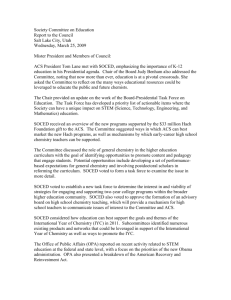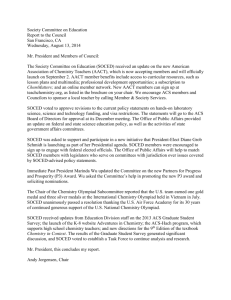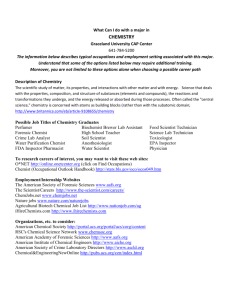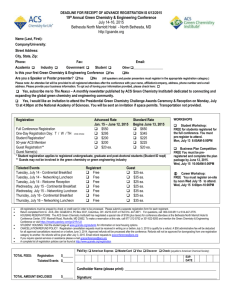ACS WEBINARS - March 2014
advertisement
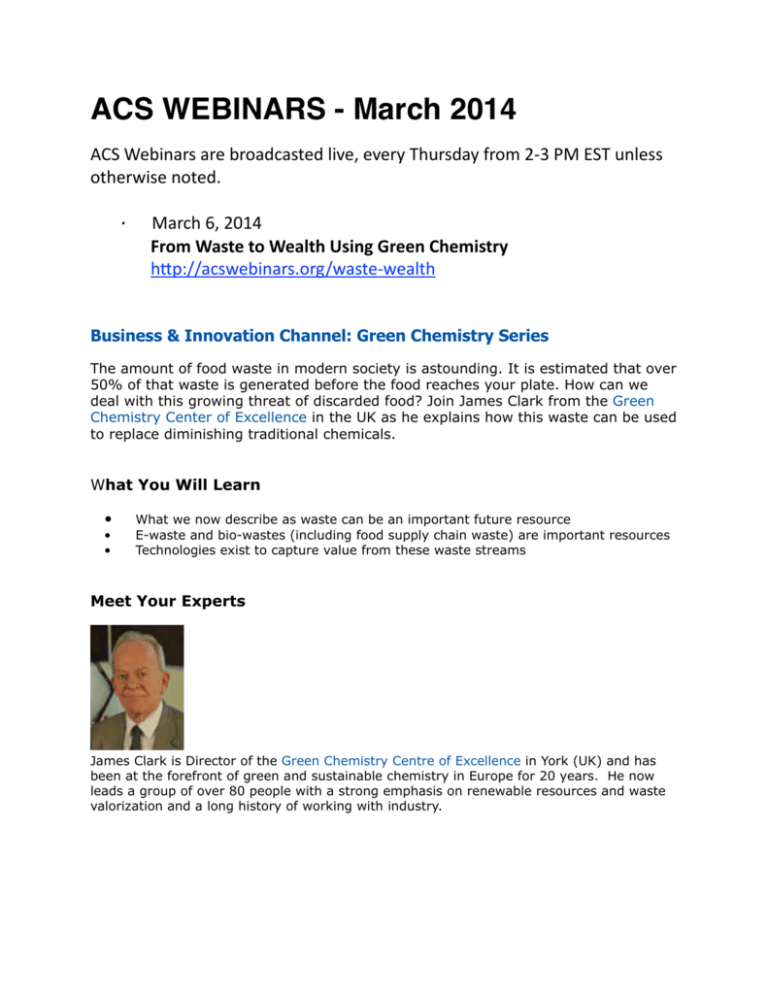
ACS WEBINARS - March 2014! ! ACS Webinars are broadcasted live, every Thursday from 2-­‐3 PM EST unless otherwise noted. · March 6, 2014 From Waste to Wealth Using Green Chemistry hFp://acswebinars.org/waste-­‐wealth ! ! Business & Innovation Channel: Green Chemistry Series The amount of food waste in modern society is astounding. It is estimated that over 50% of that waste is generated before the food reaches your plate. How can we deal with this growing threat of discarded food? Join James Clark from the Green Chemistry Center of Excellence in the UK as he explains how this waste can be used to replace diminishing traditional chemicals. What You Will Learn • ! • • ! What we now describe as waste can be an important future resource E-waste and bio-wastes (including food supply chain waste) are important resources Technologies exist to capture value from these waste streams ! Meet Your Experts James Clark is Director of the Green Chemistry Centre of Excellence in York (UK) and has been at the forefront of green and sustainable chemistry in Europe for 20 years. He now leads a group of over 80 people with a strong emphasis on renewable resources and waste valorization and a long history of working with industry. ! Dr. Joseph Fortunak is an organic chemist. He spent 21 years in the pharmaceutical industry, most recently as head of global chemical development at Abbott Labs. Dr. Fortunak is a professor at Howard University, specializing in green chemistry and global access to medicines. He works with organizations including the WHO, UNITAID, the Clinton Foundation, and the Kilimanjaro School of Pharmacy. · March 13, 2014 Detec6ng Bioterrorism: Is Chemistry Enough hFp://acswebinars.org/bioterrorism ! Detecting Bioterrorism: Is Chemistry Enough? Professional Growth Channel A biological attack could spread through a population quickly and have a devastating effect. An early detection system would be key to reducing a population’s chance of exposure. But how to you detect and identify a agent before people start getting sick? Join Dr. Kristin Omberg for a conversation on the possibilities and problems of bioaerosol detection systems and the chemistry of keeping us safe. What You Will Learn • • • • ! ! The basics of how commonly used bioaerosol detection systems work How atmospheric transport and dispersion modeling and molecular biology are combined to create systems to detect a bioaerosol attack Why a confirmed laboratory result for a biothreat agent is often inconclusive How chemists can better address biological terror Meet Your Experts ! ! Dr. Kristin Omberg is the Deputy Group Leader at Los Alamos National Laboratory’s Center for Integrated Nanotechnologies, which explores the integration of new nanoscale materials into novel architectures and microsystems. She has been the PI on several homeland security and defense programs, including the Department of Homeland Security’s BioWatch Program. Her BioWatch team advises cities on the placement of detection equipment to optimize population protection, and on post-detection decision-making. She also manages a laboratory that evaluates biothreat assays. She has a PhD in Chemistry from the University of North Carolina at Chapel Hill and a BS in Chemistry from Gonzaga University. ! ! Darren Griffin, PhD is Professor of Genetics at the University of Kent, UK. Previously he was Professor of Genetics at Brunel University. In 2002, he was admitted as a fellow of the Society of Biology and in 2008 he was awarded both a fellowship of the Royal College of Pathologists and Doctor of Science from the University of Manchester. He was awarded the Institutional Teaching Prize for his work in supervising graduate students and was recently shortlisted for Research Project of the Year by the Times Higher Education supplement. Dr. Griffin completed his post-doctoral research in Cleveland, Ohio and at The University of Cambridge. He received his PhD at University College London in 1992, graduated from the University of Manchester in 1988. ! ! · March 17-­‐18, 2014 Exclusive Access to Energy Experts from the ACS Na6onal Mee6ng hFp://acswebinars.org/dallas-­‐2014 Exclusive Access to Experts from the ACS National Meeting ! ! Professional Growth Channel Gain exclusive access to notable scientists from the ACS National Meeting in Dallas. Join us for a series of special interactive broadcasts with chemistry’s most respected names as well as its up and coming stars. Tune in to ask your questions, find out future trends and gain an insider’s insight. It’s the best kept secret in Dallas! Monday, March 17, 2014 ! ! 2:00 pm ET: Exclusive Expert Q&A Dr. John A. Rogers, Professor at University of Illinois at Urbana-Champaign & Dr. Michael R. Wasielewski, Director at the Argonne-Northwestern Solar Energy Research Center & ACS Plenary Speaker Hosted by Dr. David Harwell, Assistant Director of Industry Member Programs at ACS ! 5:00 pm ET: The Kavli Foundation Emerging Leader in Chemistry Lecture The behavior of Electrons at Nanoscopic Organic/Inorganic Interfaces Dr. Emily Weiss ! ! 6:30 pm ET: The Fred Kavli Foundation Innovations in Chemistry Lecture Biodegradable Electronics Dr. John A. Rodgers, Professor at University of Illinois at Urbana-Champaign Tuesday, March 18, 2014 ! 2:00 pm ET: Exclusive Expert Q&A Dr. Emily A Weiss, Associate Professor at Northwestern University & Dr. Florian Schattenmann, Global R&D Director at Dow Chemical Hosted by Dr. David Harwell, Assistant Director of Industry Member Programs at ACS Meet Your Experts ! Professor John A. Rogers obtained BA and BS degrees in chemistry and in physics from the University of Texas, Austin, in 1989. From MIT, he received SM degrees in physics and in chemistry in 1992 and the PhD degree in physical chemistry in 1995. Rogers’ research includes fundamental and applied aspects of materials for unusual electronic and photonic devices, with an emphasis on bio-integrated and bioinspired systems. He has published more than 400 papers and is inventor on over 80 patents, more than 50 of which are licensed or in active use. Rogers is a Fellow of the IEEE, APS, MRS and AAAS, and he is a member of the National Academy of Engineering. ! ! ! Emily Weiss is an Associate Professor and the Irving M. Klotz Research Professor in the Department of Chemistry at Northwesern University. Emily earned her PhD from Northwestern in 2005. Emily’s group studies electronic processes at organicinorganic interfaces within colloidal and semiconductor and metal nanoparticles. The objectives of this research are to understand the mechanisms of conversion of energy from one class to another. Emily was selected as a Dow Teacher-Scholar and was the recipient of a Dreyfus New Faculty Award. Emily has since earned an Air Force Young Investigator Award, a DOE Early Career Research Award, a Dreyfus Foundation Postdoctoral Program in Environmental Chemistry grant ! Professor Michael R. Wasielewski received his Bachelor of Science (1971) and Ph.D. (1975) degrees from the University of Chicago. Following his graduate work, he was a postdoctoral fellow at Columbia University. He then moved to the Argonne National Laboratory, where he rose through the ranks to become Senior Scientist and Group Leader of the Molecular Photonics Group. In 1994, he joined the faculty of Northwestern University, where he is currently the Clare Hamilton Hall Professor of Chemistry. His research has resulted in over 375 publications. Prof. Wasielewski was elected a Fellow of the American Association for the Advancement of Science in 1995, and has held numerous distinguished lectureships and fellowships. Among Prof. Wasielewski’s recent awards are the 2008 Porter Medal for Photochemistry, the 2006 James Flack Norris Award in Physical Organic Chemistry of the American Chemical Society, and the 2004 Photochemistry Research Award of the InterAmerican Photochemical Society. ! ! Dr. David Harwell is the Assistant Director of Industry Member Programs at ACS. In this role, he works within ACS to improve offerings for members working in the business of chemistry. He also serves as the lead for the ACS Entrepreneurial Initiative, which provides resources to ACS members pursuing entrepreneurial careers and endeavors. Additionally, Dave serves as an expert in the chemical industry and its effects on employment and the economy. Before joining the staff of ACS, Dave was a faculty member at the University of Hawaii focusing on silicon nanoparticles and supramolecular structures. ! · March 27, 2014 Drug Discovery Series Session 2: Coun6ng Targets – A Primer in Drug Target Classes hFp://acswebinars.org/drug-­‐discovery 2014 Drug Discovery Series Drug Discovery from A to Z What does it take to bring a drug on to the market? Learn the stages and challenges of every step by tuning in to the ACS Webinars Drug Discovery Series. Listen and discuss with subject matter experts about drug discovery, preclinical development, clinical investigation, regulatory concerns, and commercialization issues. Each new session will leave you with a better understanding of how products make it from bench to market – a big picture view that could be critical for your research! Register for the series which will be broadcast on one of the last Thursday of each month beginning February and ending October 2014. ! ! Primer in Drug Target Classes Session 2: March 27, 2014 Dr. John P. Overington (European Bioinformatics Institute) Molly Schmid !
